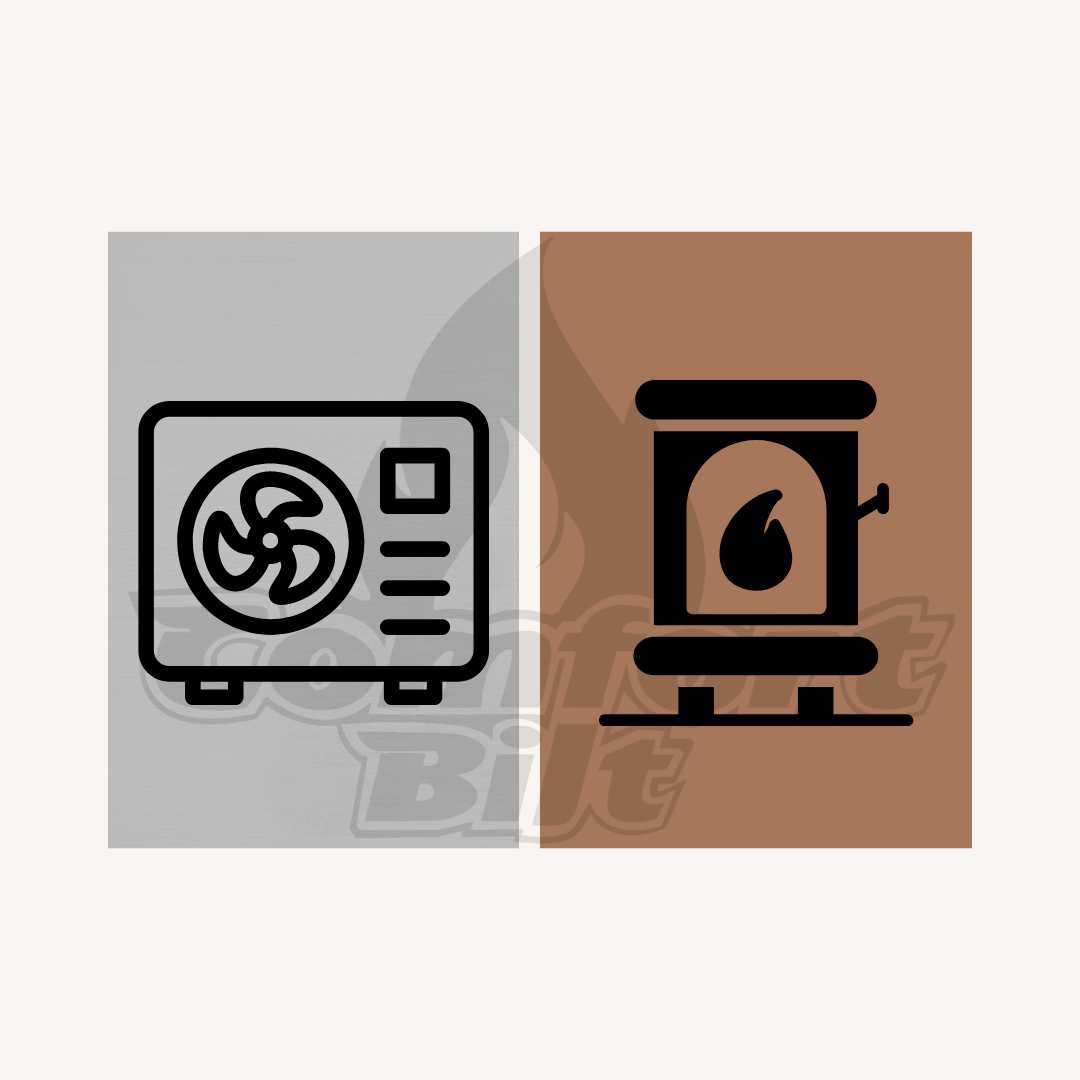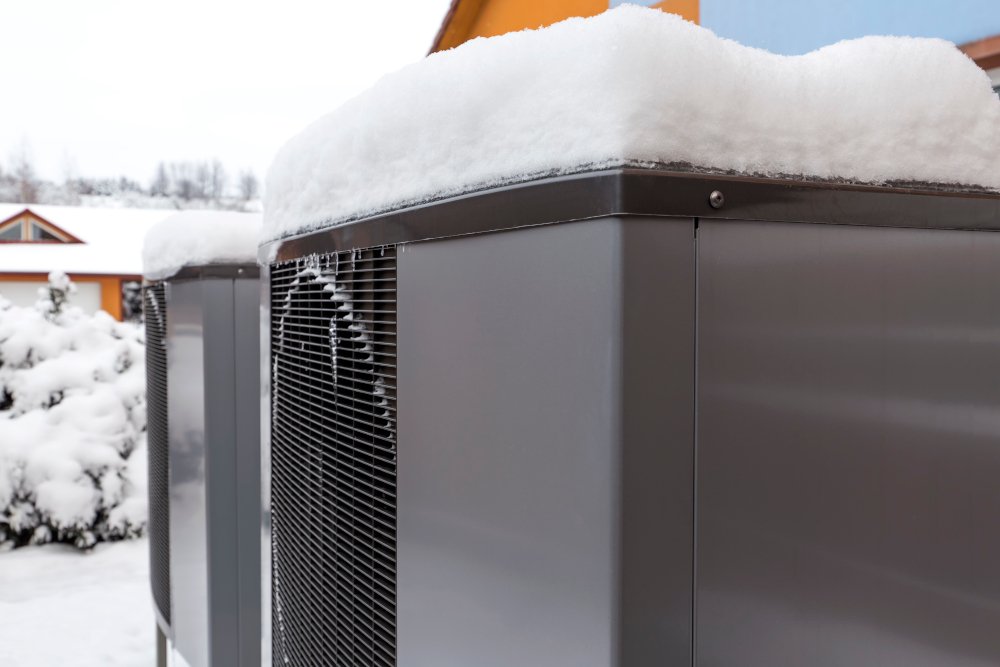Are you trying to decide between a heat pump and a pellet stove for your home? Choosing the right heating solution can be daunting.
After all, it’s not just about staying warm; it’s about comfort, efficiency, and cost. Imagine snuggling up in a cozy home without worrying about high energy bills or environmental impact. Sounds perfect, right? We’ll explore the key differences between heat pumps and pellet stoves, helping you make an informed decision that suits your lifestyle and budget.
Whether you’re looking for eco-friendly options or the most efficient heating system, this guide has you covered. Stick around to discover which option could transform your home into the ultimate cozy retreat.

Credit: woodboilers.com
Heat Pump Basics
Heat pumps are efficient devices for heating and cooling homes. They transfer heat from one place to another. This makes them versatile for different climates. Many homeowners choose them for their energy-saving features.
Understanding how they work can help you decide if they’re right for your home. Below, we’ll explore the mechanics, types, and benefits of heat pumps.
How Heat Pumps Work
Heat pumps extract heat from the air, ground, or water. They use a refrigerant to move the heat. In winter, they pull heat from outside and bring it indoors. In summer, they remove heat from inside and release it outside. This process is efficient because it moves heat rather than generating it.
Types Of Heat Pumps
There are several types of heat pumps. Air-source heat pumps are the most common. They transfer heat between the air inside and outside your home. Ground-source heat pumps, also known as geothermal, use the earth’s stable temperature. Water-source heat pumps work with nearby water bodies.
Pros And Cons Of Heat Pumps
Heat pumps offer many advantages. They are energy-efficient and can reduce utility bills. They provide heating and cooling in one unit. They have a long lifespan with proper maintenance.
There are a few drawbacks. Initial costs can be high. They might require additional insulation in colder regions. Some types need space for installation, such as ground-source systems.
Pellet Stove Fundamentals
Pellet stoves offer an efficient way to heat homes. They use compressed wood or biomass pellets. This method is eco-friendly and easy to operate. Understanding pellet stoves helps you decide if they fit your needs.
Mechanism Of Pellet Stoves
Pellet stoves burn small, compressed pellets. The pellets are fed from a hopper into the burn pot. An electric motor controls this process. The stove ignites the pellets automatically. A fan blows warm air into the room. This system provides consistent heat. It relies on electricity for operation.
Varieties Of Pellet Stoves
Pellet stoves come in different styles. Freestanding models can be placed anywhere. Insert models fit into existing fireplaces. Some are designed for heating rooms. Others can heat entire homes. The choice depends on your heating needs.
Advantages And Disadvantages Of Pellet Stoves
Pellet stoves are efficient and eco-friendly. They burn clean and produce less smoke. They require less maintenance than wood stoves. The fuel is easy to store and handle. Yet, they rely on electricity to function. This can be a drawback during power outages. They can also be more expensive upfront.
Energy Efficiency Comparison
Heat pumps offer efficient heating by transferring warmth from the outside air, reducing energy use. Pellet stoves burn renewable wood pellets, providing cozy heat but requiring regular maintenance. Each option has distinct benefits, suited for different home needs and environmental preferences.
Are you deciding between a heat pump and a pellet stove for your home’s heating needs? Understanding their energy efficiency is crucial. Both options offer unique benefits, but how do they stack up in terms of energy use? Let’s dive into the details and see which one might be the best fit for your home.Heat Pump Efficiency
Heat pumps are known for their impressive efficiency, especially in mild climates. They transfer heat rather than generate it, using electricity to move heat from one place to another. This process can be highly efficient, with some models offering efficiency rates of 300% or more. Imagine getting three times the heat energy for each unit of electricity used—it’s like buying one apple and getting two more for free! However, their efficiency can drop in extreme cold. You might need a supplemental heating source during icy winter months. So, if you live in a region with harsh winters, consider how often you’ll need additional heating.Pellet Stove Efficiency
Pellet stoves offer a different kind of efficiency. They burn compressed wood or biomass pellets, which are a renewable resource. Many pellet stoves boast efficiency rates between 70% and 90%. This means they convert a significant portion of their fuel into usable heat. Pellet stoves also provide a cozy, traditional ambiance. If you enjoy the warmth and glow of a fire, a pellet stove might appeal to you. Just remember, you’ll need space to store the pellets and time to maintain the stove.Factors Influencing Efficiency
Several factors can affect the efficiency of both heating options. For heat pumps, the type (air-source, ground-source, or ductless) and the climate are major influences. A ground-source heat pump might perform better in colder regions than an air-source model. With pellet stoves, the quality of the pellets and the stove’s design play a big role. High-quality pellets burn cleaner and more efficiently, while a well-designed stove distributes heat evenly. Consider your lifestyle and environment. Do you have easy access to quality pellets? Is your region consistently cold or does it have mild winters? These questions can guide your decision. Think about your daily routine. If convenience is key, a heat pump’s low maintenance might win you over. If you enjoy the ritual of tending a fire, a pellet stove could be more satisfying. Choosing between a heat pump and a pellet stove isn’t just about efficiency. It’s about what suits your home and lifestyle. Which one aligns with your needs?
Credit: comfortbilt.net
Cost Analysis
Choosing between a heat pump and a pellet stove involves understanding costs. Each option has its financial implications. This section breaks down the cost aspects. It focuses on installation, operational expenses, and long-term savings. Making an informed decision requires analyzing these factors closely.
Installation Costs
Heat pumps require professional installation. Costs can vary based on complexity. Expect to pay more for systems with advanced features. Pellet stoves often have lower initial setup costs. They need less technical expertise to install. This makes them a budget-friendly option for many.
Operational Costs
Heat pumps are energy-efficient. They use electricity to transfer heat, not generate it. This results in lower monthly energy bills. Pellet stoves rely on biomass fuel. The cost of pellets can fluctuate. Regular maintenance is also needed. This can increase operational expenses over time.
Long-term Savings
Heat pumps offer significant long-term savings. Their efficiency reduces energy consumption. This leads to lower utility bills. Pellet stoves can provide savings too. Especially in areas where pellets are cheap. Both options have the potential to save money over the years. Consider future costs when making a choice.
Environmental Impact
Heat pumps and pellet stoves both offer eco-friendly heating options. Heat pumps use electricity, reducing carbon emissions. Pellet stoves burn compressed wood, producing renewable energy. Each has its own impact, but both contribute to greener living.
When considering home heating options, the environmental impact can be a significant factor in your decision-making process. Both heat pumps and pellet stoves offer unique benefits and challenges to the environment. Understanding their carbon footprint, resource consumption, and sustainability can guide you toward a more eco-friendly choice.Carbon Footprint
Heat pumps are often hailed for their minimal carbon emissions, especially when powered by renewable energy sources like solar or wind. They transfer heat rather than generate it by burning fuel, which drastically reduces CO2 emissions compared to traditional heating systems. However, it’s essential to consider the source of electricity powering the heat pump; if it’s from fossil fuels, the environmental benefits may diminish. Pellet stoves, on the other hand, burn compressed wood or biomass pellets to generate heat. While they do release CO2, the pellets are made from renewable resources like sawdust and wood shavings. This means the carbon released during burning is offset by the carbon absorbed during the growth of the trees used to make the pellets. Yet, the production and transportation of pellets can increase the overall carbon footprint.Resource Consumption
Heat pumps are highly efficient, using electricity to move heat rather than generate it. This can lead to significant energy savings, but it also means an increased reliance on electrical grids. In areas where electricity is primarily generated from non-renewable sources, this could be a drawback. Pellet stoves consume wood pellets, which are a renewable resource. However, the resources used to manufacture and transport these pellets can impact their overall environmental friendliness. Consider your local availability of sustainably sourced pellets to minimize resource consumption.Sustainability Considerations
Sustainability is about balancing current needs without compromising future generations. Heat pumps, when powered by renewable energy, are a sustainable option. They reduce dependency on fossil fuels and can seamlessly integrate with solar panels for a greener solution. Pellet stoves rely on the sustainable management of forests. If sourced responsibly, they can be a sustainable heating choice. However, if the demand for pellets outpaces the ability to regenerate forests, sustainability could be compromised. Choosing between a heat pump and a pellet stove involves weighing these environmental factors. What matters most to you? Is it reducing your carbon footprint, conserving resources, or choosing a sustainable path? Each choice comes with trade-offs, but being informed helps you make a decision that aligns with your environmental values.Performance In Various Climates
Heat pumps excel in mild climates, efficiently transferring heat indoors. Pellet stoves suit colder areas, offering direct warmth from burning pellets. Both have unique advantages based on regional weather conditions.
Understanding how heat pumps and pellet stoves perform in various climates can guide you in making the best choice for your home. While both heating options have their merits, they behave differently under certain weather conditions. Let’s dive into how these systems perform across climates, ensuring you pick the right solution for your comfort and energy needs.Heat Pumps In Cold Climates
Heat pumps are often seen as less effective in extremely cold climates. They draw heat from the outside air, which becomes challenging when temperatures drop significantly. However, modern advancements have made heat pumps more efficient, even in temperatures as low as -15°C. If you live in a region with frigid winters, you might wonder if a heat pump can keep you warm. You’d be surprised to learn that many homeowners in cold areas use heat pumps successfully with a backup heating system. This combination ensures warmth without breaking the bank on energy bills.Pellet Stoves In Mild And Cold Climates
Pellet stoves, on the other hand, thrive in both mild and cold climates. They burn compressed wood pellets, providing a consistent and powerful heat source. Unlike heat pumps, pellet stoves don’t rely on the outside air for heat. This independence from external temperatures makes pellet stoves a reliable choice for chilly regions. Imagine sitting by a pellet stove on a snowy day, feeling the comforting warmth enveloping your space. It’s an experience many cherish, particularly in areas where winters are long and harsh.Adaptability To Weather Changes
Weather patterns can be unpredictable, and your heating system should be ready for any surprises. Heat pumps offer the flexibility of switching between heating and cooling modes, making them ideal for areas with fluctuating temperatures. They can seamlessly adapt to sudden weather changes, ensuring comfort year-round. Pellet stoves, while excellent at providing heat, focus solely on warming. They don’t cool your home, which might be a consideration if you live in a region where summers can be hot. Choosing between a heat pump and a pellet stove may come down to how often your climate shifts between warm and cold. Consider what matters most for your home—consistent heating, energy efficiency, or adaptability to changing seasons. Are you prepared for the unique demands of your climate? Reflect on these insights to make an informed decision that suits your lifestyle and environment.User Experience And Maintenance
Heat pumps offer consistent heating with minimal upkeep, while pellet stoves need regular cleaning and fuel loading. Both options provide energy-efficient warmth, yet user experience varies based on maintenance needs and operational convenience.
Understanding the user experience and maintenance needs of heating systems is crucial. Both heat pumps and pellet stoves offer unique experiences. They require different levels of upkeep. Let’s explore their ease of use, maintenance requirements, and durability.Ease Of Use
Heat pumps are simple to operate with a thermostat. You can set your desired temperature. They automatically maintain it. Pellet stoves need manual loading of pellets. You also adjust the air flow and heat settings. This requires more user interaction.Maintenance Requirements
Heat pumps need regular filter cleaning. This ensures efficient operation. Professional servicing is recommended annually. Pellet stoves require frequent ash removal. Cleaning the burn pot and venting system is also necessary. Regular maintenance keeps them running smoothly.Durability And Longevity
Heat pumps typically last 15 to 20 years. They depend on regular maintenance. Pellet stoves can last 10 to 15 years. Their lifespan varies with usage and care. Both systems offer long-term heating solutions. But maintenance affects their longevity. `
Credit: www.climapolska.com.pl
Choosing The Right Option
Choosing between a heat pump and pellet stove depends on specific needs. Heat pumps efficiently heat and cool homes. Pellet stoves offer cozy warmth and ambiance. Consider costs and environmental impact. Each option serves different purposes.
Choosing the right heating option for your home can feel like a daunting task, especially when faced with choices like heat pumps and pellet stoves. Each option offers unique benefits and challenges, making it essential to evaluate your specific needs. The right choice can not only enhance comfort but also improve energy efficiency and savings in the long run.Assessing Your Needs
Start by considering your home’s heating requirements. Are you looking for a primary heating source or a supplementary one? If you live in a region with mild winters, a heat pump might be sufficient as it provides both heating and cooling. On the other hand, if you prefer the cozy ambiance of a real flame, a pellet stove could be more satisfying. Think about your lifestyle and preferences. Do you enjoy the idea of managing a pellet supply, or do you prefer the convenience of a heat pump’s automatic operation?Budget Considerations
Your budget is a critical factor in this decision. Initial costs for heat pumps are often higher, but they can lead to significant savings on energy bills over time. Pellet stoves may have a lower upfront cost, but fuel expenses can add up, especially during colder months. Consider not just the installation costs but also the ongoing maintenance and operational expenses. Make a list of potential expenses to compare both options effectively. It’s wise to think long-term and not just focus on immediate costs.Future-proofing Your Home
Think about how your choice will affect your home in the future. A heat pump can increase your home’s value due to its energy efficiency and dual functionality. With the growing emphasis on renewable energy, a heat pump may align better with future environmental standards. Pellet stoves, however, offer a renewable energy source that can appeal to eco-conscious homeowners. Consider your home’s potential resale value and how your heating choice might appeal to future buyers. Are you planning to stay in your current home for a long time, or is resale a consideration? Choosing between a heat pump and a pellet stove is not just about immediate comfort. It’s about making a decision that aligns with your lifestyle, budget, and future aspirations. Take the time to weigh your options carefully. What matters most to you in a heating solution?Frequently Asked Questions
Which Is More Energy-efficient, Heat Pump Or Pellet Stove?
Heat pumps are generally more energy-efficient. They use electricity to transfer heat. Pellet stoves burn pellets for warmth.
Can Pellet Stoves Heat Large Spaces Effectively?
Yes, pellet stoves can heat large areas. They work well in open spaces. Pellet stoves are strong and reliable.
What Are The Installation Costs For A Heat Pump?
Heat pump installation is costly. Prices vary with size and type. Professional installation is often required.
Are Heat Pumps Better For The Environment Than Pellet Stoves?
Yes, heat pumps are eco-friendly. They use renewable energy sources. Pellet stoves emit smoke and ash.
How Often Do Pellet Stoves Need Maintenance?
Pellet stoves need regular cleaning. Ash removal and pellet hopper checks are necessary. Annual professional maintenance is recommended.
Conclusion
Choosing between a heat pump and a pellet stove depends on your needs. Both options offer benefits for heating your home effectively. Heat pumps provide energy efficiency and cooling in summer. Pellet stoves deliver cozy warmth with renewable energy. Consider your budget, climate, and space when deciding.
Think about installation and maintenance costs too. Both systems have their pros and cons. Evaluate which fits your lifestyle best. Make a choice that suits your comfort and environmental goals. Remember, each home is unique. Choose wisely for warmth and efficiency.
Your comfort is the priority.




